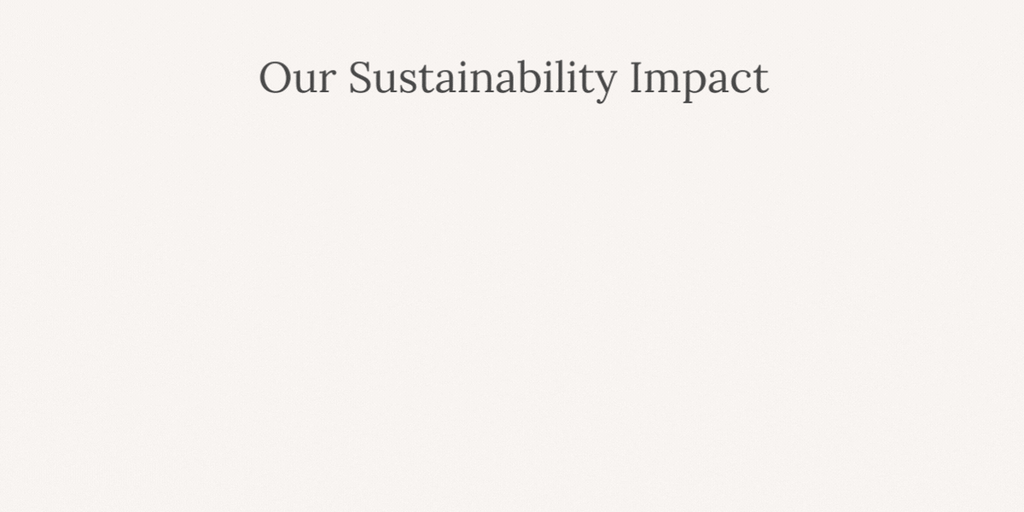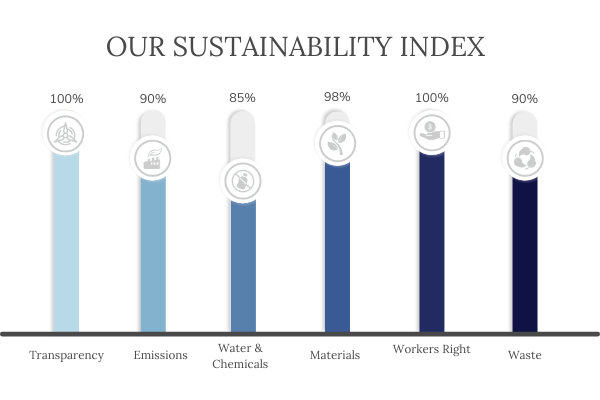LÂCHER PRISE IS AT THE HEART OF THE CURRENT ECOLOGICAL CONTEXT. THE BRAND DISTINGUISHES ITSELF WITH ITS RESPONSIBLE VALUES, SOLIDARITY APPROACH, AND STRONG ENVIRONMENTAL AND SOCIAL COMMITMENTS.
Since the beginning, our mission has been to create ethical garments that are made to feel. Our process starts with consciousness. We consider both people and our planet when sourcing our fabrics, and make sure every decision is intentional.
We want to do our part to lower that statistic by not overproducing clothes and materials.
Can you believe that only 10% of mass-produced fabric rolls will be used during production? Those mounds of deadstock fabric can end up in landfills, or they can be used to create beautiful new garments with a long life.
We source most of our materials, including deadstock, from trusted suppliers right here in the U.S. We are proud to say that all of our suppliers provide their employees with a fair living wage, equal pay, and good working conditions. They recognize their employees as craftsmen and treat them with dignity and respect.
WE BELIEVE THIS ETHICAL PRODUCTION CREATES A SPECIAL ENERGY THAT’S REFLECTED IN OUR GARMENTS. IT ENHANCES THEIR QUALITY, TOO.
To understand progress and establish accountability, the fashion industry needs a transparent and tangible means to track its state of progress. “The BoF Sustainability Index aims to create a transparent and trusted benchmark to track clearly defined, measurable progress towards achieving sustainability goals in the fashion industry.”
It is separated into 6 categories:
- Transparency
- Emissions
- Water & Chemicals
- Materials
- Workers’ Rights
- Waste
Using our best and most truthful judgment and disclosure, we decided to apply the Bof sustainability index benchmark to measure and assess Lâcher Prise’s sustainability impact based on the same criteria. Above is how Lâcher Prise has been performing as of February 2022.
1. Transparency
''I think transparency is the future because it has the power to establish trust among people in the supply chain which is essential for the existence of all of us on this planet.''
Mostafiz Uddin, Garment Manufacturer
Fashion’s modern and intercontinental business model is based on intricate supply chains that are almost impossible to monitor. That often enables human rights abuses to go undetected or ignored. It also makes it difficult to establish the extent of the industry’s environmental impact or measure the success of efforts to reduce it.
This Index is powered by public disclosures. Transparency is the cornerstone of any effort to drive meaningful change, establish accountability, and benchmark progress.
At Lâcher Prise, we disclose as much information as we can on our supply chain traceability from our fabric suppliers to our manufacturer. We have nothing to hide and promise to publicly release new partnerships and take accountability for our environmental and social impact.
2. Emissions
The complex and globalized trading infrastructure of the fashion industry has made greenhouse gas emissions skyrocket in the last 30 years.
“The fashion industry was responsible for at least 4 percent of global greenhouse-gas (GHG) emissions in 2018—more than the carbon output of the economies of France, Germany, and the United Kingdom combined.”
The industry needs to urgently act to reduce its green gas emissions and limit global warming to no more than 1.5 degrees.
We at Lâcher Prise decided to create a Pact with Mother Nature.
We are aware of the urgency of global warming, which is why we prioritize creating a fair circular life for our clothes.
For each purchase, we plant at least 2 trees. In this way, we not only give back to nature what it’s been given to us, but we also offset all carbon emissions created during production and order shipment.
3. Water + Chemicals
“The fashion industry’s impact on global water supply stretches from notorious water- and pesticide-intensive cotton farms to the chemicals required to process materials and dye fabrics, and the microfibres that escape in the wash and reappear in the oceans.”
Lâcher Prise only works with certified sustainable fibers such as Lenzing and GOTS, assuring that no hazardous chemicals, nor water waste were used at any stage of our production line.
4. Materials
“Most clothes in the world are made using fossil fuels. Oil-based polyester is the most commonly used fabric in the world, with nearly 60 million tonnes produced in 2019. Fashion’s second-favorite fiber is cotton, a product with a complicated environmental footprint whose present links to modern slavery are as problematic as its past.”
The growing demand behind more sustainable and regenerative agricultural practices holds out the prospect to not only mitigate fashion’s footprint but perhaps one day enable the industry to have a net positive impact.
Starting from our raw materials, we make sure the trees used for the production of our staple Modal fabric come from reliable forests and not deforestation. We work only with certified plant-based materials allowing our fabric to revert to nature at the end of a product’s life.
5. Workers’ Right
The rise of today’s fast-moving, mass market, and globalized fashion system has created complex and unequal supply chains, plagued by labor abuses that range from poor wages and excessive overtime to fatally unsafe conditions, child labor, and modern slavery.
The industry’s effort to manage the problems through private inspections and certifications have created a multi-billion-dollar audit industry.
At Lâcher Prise, our manufacturers are defined on a human and ethical scale, complying with environmental and labor regulations. We can only be confident to work with partners that can provide us with fair living wages, certifications, and benefits. The capacity of our workshops is often reduced and perfect for conscious and slow fabrication.
6. Waste
“Every second, the equivalent of one garbage truck of textiles is landfilled or burned. An estimated USD 500 billion value is lost every year due to clothing that’s barely worn and rarely recycled.”
- ‘A New Textiles Economy: Redesigning fashion’s future,’ Circular Fibres Initiative
The rise of affordable fast fashion means consumers now buy more clothes, but use them for less time than ever before. We are aware of the urgency of global warming, this is why we prioritize and create a fair circular life for our clothes.
All of our designs are produced according to strict rules, our fabrics are biodegradable to ensure that our product’s end-of-life is respected and that the future is not made of stacked clothing polluting our land and oceans.











